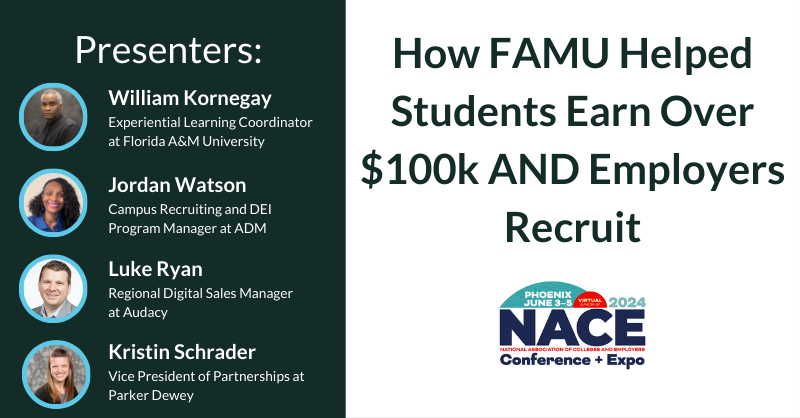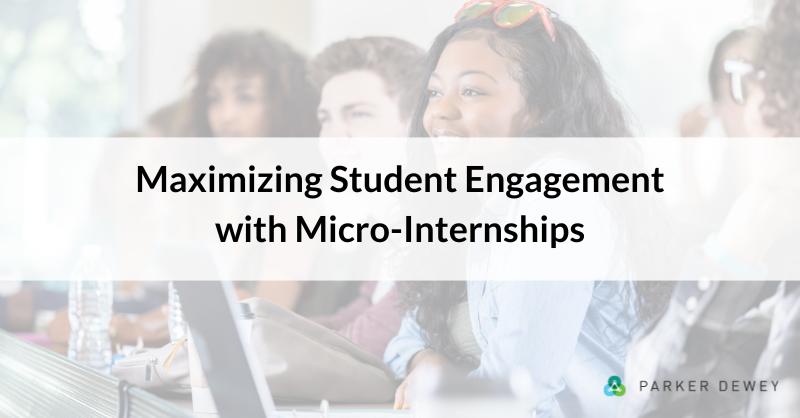
Revolutionizing Early-Career Hiring with Micro-Internships
This challenge was echoed during the recent NACE24 Virtual Conference in a presentation titled “How FAMU Helped Students Earn Over $100k AND Employers Recruit,” featuring William Kornegay, Experiential Learning Coordinator at Florida A&M University, Jordan Watson, Campus Recruiting and DEI Program Manager at ADM, Luke Ryan, Regional Digital Sales Manager at Audacy, and Kristin Schrader, Vice Presidents of Partnerships at Parker Dewey. However, they shared how the innovative approach of Micro-Internships has revolutionized their hiring processes and helped them better assess candidates' skills at scale.
The Value of Micro-Internships for Students
William Kornegay highlighted the immense value his students received from participating in Micro-Internships.
"The vast majority of Micro-Internships are virtual, which is a godsend for students who don’t have access to traditional internships because they aren’t on campus when employers are on campus."
This accessibility has opened doors for many students, allowing them to gain valuable experience without geographical constraints. Moreover, William emphasized how Micro-Internships create opportunities for underclassmen and diverse students.
"Micro-Internships provide opportunities for younger students who don't have as much experience or academic background as some of the older students who are looking for full-time internships."
This flexibility enables a broader range of students to build their resumes and professional networks early in their academic careers.
Breaking Away from Traditional Hiring Methods
Traditional hiring processes often fall short when it comes to evaluating the real-world skills of early-career candidates. Jordan Watson highlighted the common struggles with engaging and evaluating Generation Z talent, who frequently change their career plans and require more diverse and flexible work environments.
"We are finding that just in general, Gen Z behavior shows that students are not confident in their career paths early on, and they’re often changing their majors."
This uncertainty makes it difficult for employers to gauge whether a candidate is the right fit for their organization.
The Micro-Internship Advantage
Kristin Schrader shared her perspective on the benefits for both students and employers.
"Students can explore their careers, grow their resume, and expand their professional network because they’re demonstrating real experience and real skills that will hopefully be a great stepping stone for whatever long-term role they ultimately pursue."
This hands-on experience is invaluable for students and gives employers a clearer picture of a candidate's capabilities.
Luke Ryan also emphasized the immediate impact and versatility of Micro-Internships.
"One of the things that we love most is that they can get started right away. There’s not really much of a ramp-up time needed. We design our project, lay out the scope of work, and they’re off and running."
By engaging with candidates through Micro-Internships, employers like ADM and Audacy can effectively assess the skills and fit of potential hires in real-world scenarios. This method not only helps in identifying top talent but also provides valuable hands-on experience to the interns. Jordan Watson elaborated on this:
"Micro-Internships allowed us to tap into a wider pool of talent beyond the traditional recruiting channels, including students from diverse backgrounds and various academic institutions."
Real Impact and Real Results
The success stories from both companies underline the tangible benefits of integrating Micro-Internships into the hiring process. Luke Ryan described a project where Micro-Interns helped with business development tasks, leading to significant improvements in their outreach efforts. "They helped us with building a prospect list that was pretty detailed, which we then used to develop new business opportunities," he said.
Similarly, Jordan highlighted the inclusivity and accessibility that Micro-Internships bring to their recruitment strategy.
"Micro-Internships offered students the opportunity to fulfill their commitments while expanding their skills and engaging in meaningful work."
This flexibility is particularly beneficial for students who have other obligations that prevent them from participating in traditional internships.
A Win-Win for Employers and Early-Career Talent
The insights from Kristin, William, Jordan, and Luke demonstrate how Micro-Internships can be a game-changer for employers who regularly hire early-career talent. By providing a platform to assess candidates' skills in a real-world setting, Micro-Internships ensure that employers can make more informed hiring decisions. At the same time, they offer students invaluable experience and a stepping stone to their future careers.
In conclusion, embracing Micro-Internships can lead to a more effective and inclusive hiring process, bridging the gap between employers' expectations and the actual skill levels of early-career candidates. As Jordan aptly put it,
"Micro-Internships allowed us to reach out to students who may not have had the opportunity to participate in full-time internships, thereby providing equitable access to professional experiences for all students."
By rethinking traditional hiring methods and integrating Micro-Internships, employers can not only enhance their recruitment strategies but also contribute to the professional growth of the next generation of talent.



.png)
